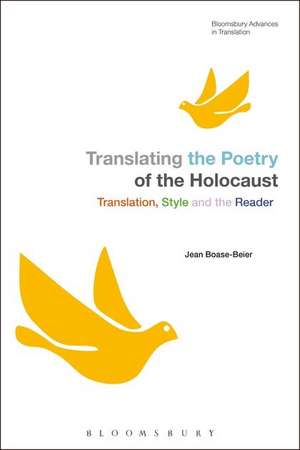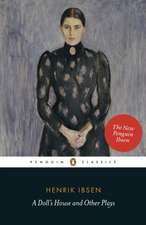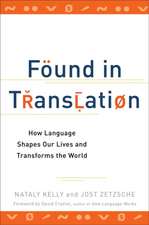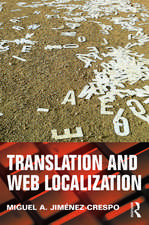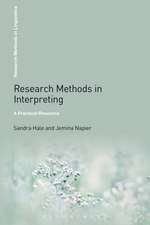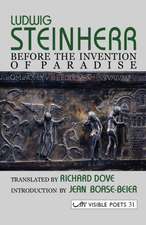Translating the Poetry of the Holocaust: Translation, Style and the Reader: Bloomsbury Advances in Translation
Autor Dr Jean Boase-Beieren Limba Engleză Paperback – 20 mai 2015
| Toate formatele și edițiile | Preț | Express |
|---|---|---|
| Paperback (1) | 256.59 lei 6-8 săpt. | |
| Bloomsbury Publishing – 20 mai 2015 | 256.59 lei 6-8 săpt. | |
| Hardback (1) | 947.94 lei 6-8 săpt. | |
| Bloomsbury Publishing – 20 mai 2015 | 947.94 lei 6-8 săpt. |
Din seria Bloomsbury Advances in Translation
- 23%
 Preț: 192.55 lei
Preț: 192.55 lei - 22%
 Preț: 257.03 lei
Preț: 257.03 lei - 21%
 Preț: 218.74 lei
Preț: 218.74 lei - 22%
 Preț: 225.24 lei
Preț: 225.24 lei - 22%
 Preț: 256.20 lei
Preț: 256.20 lei - 23%
 Preț: 198.30 lei
Preț: 198.30 lei - 22%
 Preț: 230.79 lei
Preț: 230.79 lei - 14%
 Preț: 197.77 lei
Preț: 197.77 lei - 23%
 Preț: 192.48 lei
Preț: 192.48 lei - 22%
 Preț: 238.22 lei
Preț: 238.22 lei - 22%
 Preț: 259.34 lei
Preț: 259.34 lei - 23%
 Preț: 198.30 lei
Preț: 198.30 lei -
 Preț: 217.62 lei
Preț: 217.62 lei - 13%
 Preț: 257.03 lei
Preț: 257.03 lei - 13%
 Preț: 263.62 lei
Preț: 263.62 lei - 30%
 Preț: 569.06 lei
Preț: 569.06 lei - 13%
 Preț: 238.94 lei
Preț: 238.94 lei - 13%
 Preț: 181.77 lei
Preț: 181.77 lei - 30%
 Preț: 598.45 lei
Preț: 598.45 lei - 22%
 Preț: 239.02 lei
Preț: 239.02 lei - 23%
 Preț: 197.86 lei
Preț: 197.86 lei - 22%
 Preț: 256.59 lei
Preț: 256.59 lei - 11%
 Preț: 344.52 lei
Preț: 344.52 lei - 23%
 Preț: 191.04 lei
Preț: 191.04 lei - 24%
 Preț: 189.70 lei
Preț: 189.70 lei - 22%
 Preț: 258.42 lei
Preț: 258.42 lei - 13%
 Preț: 257.12 lei
Preț: 257.12 lei
Preț: 256.59 lei
Preț vechi: 295.39 lei
-13% Nou
Puncte Express: 385
Preț estimativ în valută:
49.11€ • 50.61$ • 41.46£
49.11€ • 50.61$ • 41.46£
Carte tipărită la comandă
Livrare economică 03-17 martie
Preluare comenzi: 021 569.72.76
Specificații
ISBN-13: 9781441178657
ISBN-10: 1441178651
Pagini: 192
Dimensiuni: 156 x 234 x 10 mm
Greutate: 0.32 kg
Editura: Bloomsbury Publishing
Colecția Bloomsbury Academic
Seria Bloomsbury Advances in Translation
Locul publicării:London, United Kingdom
ISBN-10: 1441178651
Pagini: 192
Dimensiuni: 156 x 234 x 10 mm
Greutate: 0.32 kg
Editura: Bloomsbury Publishing
Colecția Bloomsbury Academic
Seria Bloomsbury Advances in Translation
Locul publicării:London, United Kingdom
Caracteristici
First book-length study of the important role of translation in Holocaust poetry.
Notă biografică
Jean Boase-Beier is Professor of Literature and Translation at the University of East Anglia, UK.
Cuprins
1. Holocaust Poetry and Holocaust Poetics2. Reading Holocaust Poetry in and as Translation3. Translating Holocaust Poetry4. Translation and UnderstandingBibliographyIndex
Recenzii
This volume's greatest contribution ... is in its well-informed call to translate, and make visible, a significant corpus of Holocaust-related poetry still unavailable in English.
In this clear-sighted and innovative work, Jean Boase-Beier presents a compelling account of translated Holocaust poetry ... An important and unique strength of the book resides in its applied approach, with Boase-Beier drawing insightfully on her own experience of translating ... The book is bound to become a theoretical touchstone for all those who are interested in the confluence between translation and the transmission of Holocaust memory ... [It] will undoubtedly serve to expand the translator's toolkit and, simultaneously, promote critical thinking about the responsibility of the translator as a conduit for empathy and remembrance.
Professor Boase-Beier's deeply reflective and many-layered book about the poetics of Holocaust poetry requires more than one attentive reading. It is a brilliant and meticulous analysis about the process of reading poetry - through its variously translated forms - intelligently, with due empathy and proper cognitive regard... Her work emphasises the need for empathy and memory as she highlights the symbiotic and living relationship between the original author, the various translator(s) and active readers. This book is to be valued and returned to, again and again.
A stimulating and extremely determined attempt to get to grips with the relationship between text and context and the centrality of that relationship to our construction of meaning in general and to the practice of translation in particular. Whether Boase-Beier is using these reflections as an aid for the translator, or using the translation problem to get closer to the texts and our experience of them is largely irrelevant.
In this clear-sighted and innovative work, Jean Boase-Beier presents a compelling account of translated Holocaust poetry ... An important and unique strength of the book resides in its applied approach, with Boase-Beier drawing insightfully on her own experience of translating ... The book is bound to become a theoretical touchstone for all those who are interested in the confluence between translation and the transmission of Holocaust memory ... [It] will undoubtedly serve to expand the translator's toolkit and, simultaneously, promote critical thinking about the responsibility of the translator as a conduit for empathy and remembrance.
Professor Boase-Beier's deeply reflective and many-layered book about the poetics of Holocaust poetry requires more than one attentive reading. It is a brilliant and meticulous analysis about the process of reading poetry - through its variously translated forms - intelligently, with due empathy and proper cognitive regard... Her work emphasises the need for empathy and memory as she highlights the symbiotic and living relationship between the original author, the various translator(s) and active readers. This book is to be valued and returned to, again and again.
A stimulating and extremely determined attempt to get to grips with the relationship between text and context and the centrality of that relationship to our construction of meaning in general and to the practice of translation in particular. Whether Boase-Beier is using these reflections as an aid for the translator, or using the translation problem to get closer to the texts and our experience of them is largely irrelevant.
